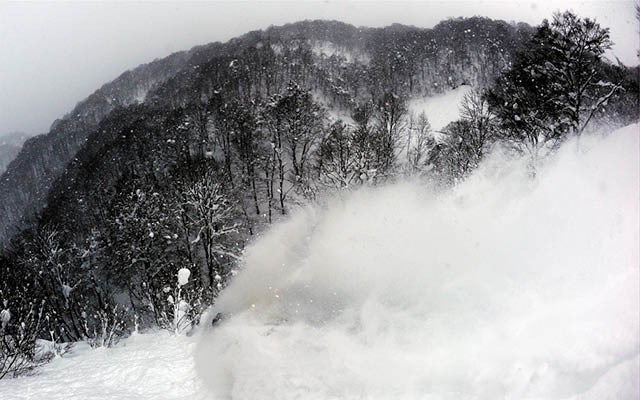It's difficult to remember when skiing didn't hold significance for me, but I know that dark star of youthful frivolity still lurks, lodged somewhere in the ether. Doubtless those were days of physical fumbling, uncertain amusement, and awkward fraternity. Sometime later, as skiing became a more frequent habit, the worm turned: solo time in the snow — an element most people I knew sought to avoid — became escape and necessity.
I suppose I have Powder magazine to thank for that; even now, in the year of its 45th anniversary, I remain grateful for a debt that has never been a burden. Browsing my first copy at a subway newsstand one soggy winter day, the awkward teen occupying my body at the time saw portrayed not only what skiing was, but what it could be, and, perhaps more urgently, how that might be made to happen. These days, we'd call it a teaching moment. In having my own imagination projected back at me, the entirety of my connection with skiing changed. Plus now I had a guidebook to the relationship.
So... the first thing that skiing seemed was important. Keening to that — both as skier and writer — I practically dove down the rabbit hole that opened before me. For a while, the "importance" of skiing was the central theme of what I proudly called a job. After all, the premise of any magazine is to sell its subject through celebration. In retrospect, however, my concept of what this entailed began to change almost from the start; when you're preaching to an eager choir, I found, what's truly important easily becomes distorted. Given an international pulpit afforded by magazines, I spent years rattling off entertaining litanies of what I thought mattered to skiers. Of course, this meant I was essentially telling them these things should matter — but who was I to lecture?
While immersion in the white-hot core of a molten sport may have had a flattening effect on my objectivity, self-questioning, at least, continued. Looking around, I revised my outlook, concluding that skiing held no gravity in any larger context, but was nonetheless important to me. And that magazines and movies and introspective columns were but tools employed to figure out what skiing meant to their readers, viewers and creators. This cast the act of ripping down a mountain as an open physical question of sorts, to which each would have their own answer. Some of these, of course, would be similar; others truly unique. And after years of rolling with an international coterie of ski friends, photographers, moviemakers, writers, athletes, and other aspirants, I came to believe that the most common answer, in whole or in part, was actually a pretty simple one: skiing was fun, dammit. That was why we skied.
This, it felt, implied the proper corollary: something that was only fun couldn't also be important. And perhaps that was why notions of pure joy and playfulness seemed anathema to the machinations of an overly-serious ski industry, undermining its essential hauteur. To state so was revolution. To publish a magazine based on it — as Powder's first editors set out to do — a de facto act of commercial treason. Now I wondered why it had taken me so long to figure this out. Rebels like Shane McConkey would go on to make a living holding up this mirror while simultaneously driving the bus. I got aboard early, and it dominated my perceptions for a decade — a certainty profound enough to base a book on.
Then the worm turned again.
If skiing was only fun, I mused, then why did so many — myself included — continue to treat it as something of great import in their lives? The answer to this also felt devilishly facile: because we do it. We ski not because it's important in any existential or global sense, but because it is personally meaningful: we construct our lives; we do things we enjoy; we imbue these with meaning; we find meaning important. Skiing is meaningful in being personal challenge, passage and movement. In planting inchoate seeds of outdoor affinity and winter community. In exploring freedom and self-expression. And in delivering that much-craved chemistry we call thrill. Meaningful, ultimately, as an answer to so many of our unformulated questions about life.
In hindsight, my entire ski-writing career has comprised investigating the dual quandaries of why skiing is important, and why we ski. And after 25 years of over-thinking and rejecting and rethinking, I finally have a summary worth sharing — one whose logic cannot be reopened. The reasons for both are the same, and dwell in a closed feedback loop: that skiing is fun makes it more important to us, that it's important to us makes it more fun. But not just the fun of social currency or a carnet of friendship. If you believe what the Dalai Lama and other spiritual thinkers say about laughter and happiness, it's all right there: fun, they aver, is the highest form of self-affirmation. And that not only makes fun important, but perhaps the greatest teacher of all.
Leslie Anthony is a Whistler-based author, editor, biologist and bon vivant who has never met a mountain he didn't like.




